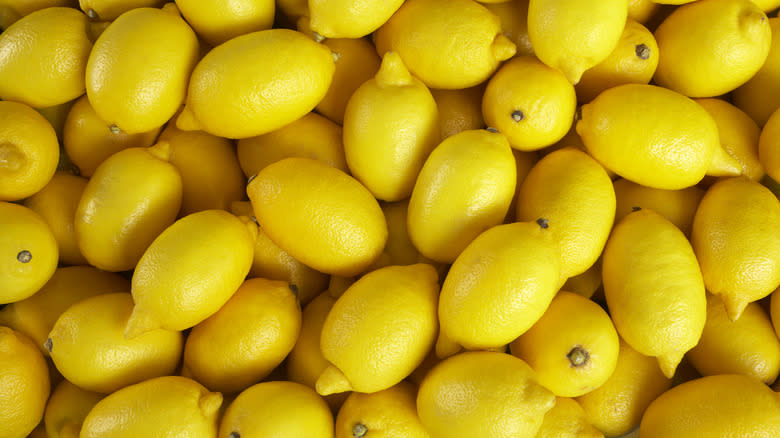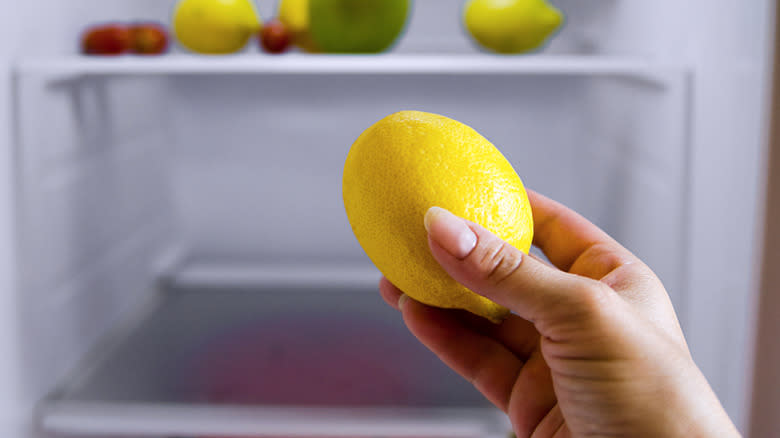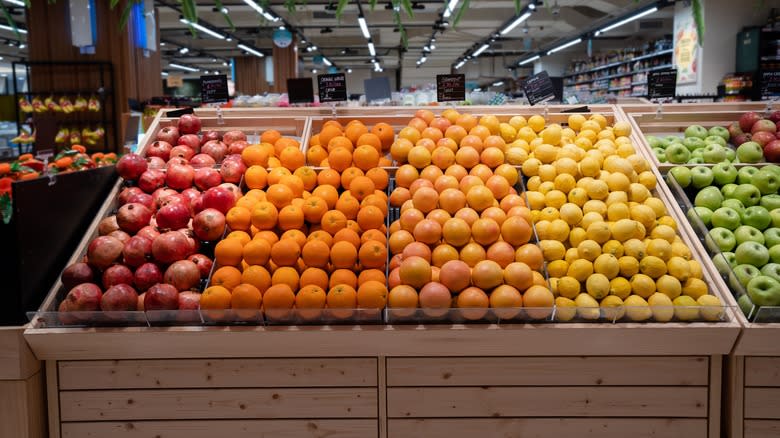Where's The Best Place To Store Lemons?

When it comes to keeping produce fresh, there's an overwhelming amount of factors to think about. How exactly you should be washing your fruits and vegetables is one of those important questions, but one of the absolute biggest points of contention is how you should be storing your vegetables and fruits to keep them crisp.
Every single kiwi, banana, or avocado has its own unique qualities and strict storage requirements, and it can be mind-boggling to keep track of it all. This is especially true of fragile citrus fruits like lemons. You often see these sunny spheres kept at room temperature in the grocery store, but many people opt to stick these guys in the fridge when they get home. So, which storage technique is best? Well, save some exceptions, the refrigerator is usually the best place for ripe or cut lemons to be.
To keep your lemons fresh for longer periods of time, the fridge is your best option. The cold temperatures seal in freshness better than warm and can keep your whole citrus fruits extra tart and vibrant for up to four or six weeks at a time. Without those cold temperatures, lemons will stay good for a much shorter time frame of up to one week, at best.
Read more: The 6 Best And 6 Worst Grocery Stores To Buy Produce From
How To Store Your Lemons For Maximum Freshness

To avoid any fruit storage mistakes, it's always best to take into account when exactly you plan to use your lemons first. For all those who want to hold onto lemons for as long as possible, saving them for an impromptu recipe later in the month, don't just toss them into your fridge. Ensure maximum freshness by sealing your citrus in an airtight bag or container first to keep out any excess air. Then, place your sealed fruit in a crisper drawer to keep it fresh in low-humidity conditions. It's important to keep your fruit away from ethylene gas-emitting fruits in your drawer like apples or tomatoes, as those produce items will further speed up the ripening process of your lemons.
Now, if you've got a cut lemon instead of a whole one, you should wrap the exposed flesh in plastic wrap first, then seal the fruit in a container before storing it in the crisper drawer. Cut lemons have a much shorter lifespan than whole lemons, usually for only a few days, so you'll need to use these much faster than your whole ones.
Other Important Lemon Storage Tips To Keep In Mind

While the fridge is generally the best place to store your whole or cut lemons, there are some exceptions. Green, unripe lemons, for example, should be kept at room temperature until they turn yellow to speed up the ripening process. Then, after they're ripe, you can stick them in the fridge. Alternatively, if you've got a whole lemon that you plan to use within the week, you can keep these on the counter too, as you don't need the extra storage time.
No matter how you choose to store your fruit, remember to look out for any signs of spoilage along the way like mushy or shriveled skin, mold, or strong, fermented smells. You'll want to throw any lemons with these qualities into the bin, as this most likely means the citrus has gone bad.
So, if you're eager to dig into your bright citrus treats as soon as possible, room-temperature storage will work just fine. Otherwise, keep them in the fridge to ensure that the fruit will be ripe and ready when you really need them. But hey, don't forget to remove your lemons from the cold a few hours before you use them. Lemon juice is harder to extract when this fruit is cold, so to avoid struggling with juicing lemons, keep that fact in mind too.
Read the original article on Daily Meal.

